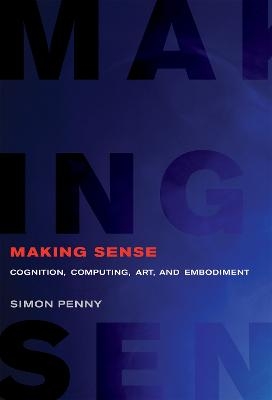
Making Sense
Cognition, Computing, Art, and Embodiment
Seiten
2019
MIT Press (Verlag)
978-0-262-53823-7 (ISBN)
MIT Press (Verlag)
978-0-262-53823-7 (ISBN)
Why embodied approaches to cognition are better able to address the performative dimensions of art than the dualistic conceptions fundamental to theories of digital computing.
In Making Sense, Simon Penny proposes that internalist conceptions of cognition have minimal purchase on embodied cognitive practices. Much of the cognition involved in arts practices remains invisible under such a paradigm. Penny argues that the mind-body dualism of Western humanist philosophy is inadequate for addressing performative practices. Ideas of cognition as embodied and embedded provide a basis for the development of new ways of speaking about the embodied and situated intelligences of the arts. Penny argues this perspective is particularly relevant to media arts practices.
Penny takes a radically interdisciplinary approach, drawing on philosophy, biology, psychology, cognitive science, neuroscience, cybernetics, artificial intelligence, critical theory, and other fields. He argues that computationalist cognitive rhetoric, with its assumption of mind-body (and software-hardware) dualism, cannot account for the quintessentially performative qualities of arts practices. He reviews post-cognitivist paradigms including situated, distributed, embodied, and enactive, and relates these to discussions of arts and cultural practices in general.
Penny emphasizes the way real time computing facilitates new modalities of dynamical, generative and interactive arts practices. He proposes that conventional aesthetics (of the plastic arts) cannot address these new forms and argues for a new "performative aesthetics." Viewing these practices from embodied, enactive, and situated perspectives allows us to recognize the embodied and performative qualities of the "intelligences of the arts."
In Making Sense, Simon Penny proposes that internalist conceptions of cognition have minimal purchase on embodied cognitive practices. Much of the cognition involved in arts practices remains invisible under such a paradigm. Penny argues that the mind-body dualism of Western humanist philosophy is inadequate for addressing performative practices. Ideas of cognition as embodied and embedded provide a basis for the development of new ways of speaking about the embodied and situated intelligences of the arts. Penny argues this perspective is particularly relevant to media arts practices.
Penny takes a radically interdisciplinary approach, drawing on philosophy, biology, psychology, cognitive science, neuroscience, cybernetics, artificial intelligence, critical theory, and other fields. He argues that computationalist cognitive rhetoric, with its assumption of mind-body (and software-hardware) dualism, cannot account for the quintessentially performative qualities of arts practices. He reviews post-cognitivist paradigms including situated, distributed, embodied, and enactive, and relates these to discussions of arts and cultural practices in general.
Penny emphasizes the way real time computing facilitates new modalities of dynamical, generative and interactive arts practices. He proposes that conventional aesthetics (of the plastic arts) cannot address these new forms and argues for a new "performative aesthetics." Viewing these practices from embodied, enactive, and situated perspectives allows us to recognize the embodied and performative qualities of the "intelligences of the arts."
Simon Penny is Professor of Art at the Claire Trevor School of the Arts at the University of California, Irvine, teaching mechatronic art, media art history and theory, and interdisciplinary seminars interfacing contemporary cognitive science and philosophy of mind with the arts. Trained as a sculptor, he has spent much of his career building interactive art environments with custom robotic and sensor-based systems.
| Erscheinungsdatum | 31.07.2019 |
|---|---|
| Reihe/Serie | Leonardo |
| Zusatzinfo | 31 b&w illus.; 62 Illustrations |
| Sprache | englisch |
| Maße | 152 x 229 mm |
| Themenwelt | Kunst / Musik / Theater |
| Geisteswissenschaften ► Psychologie ► Biopsychologie / Neurowissenschaften | |
| Geisteswissenschaften ► Psychologie ► Sucht / Drogen | |
| Sozialwissenschaften ► Kommunikation / Medien ► Medienwissenschaft | |
| ISBN-10 | 0-262-53823-7 / 0262538237 |
| ISBN-13 | 978-0-262-53823-7 / 9780262538237 |
| Zustand | Neuware |
| Haben Sie eine Frage zum Produkt? |
Mehr entdecken
aus dem Bereich
aus dem Bereich
Grundlagen, Klinik, Rehabilitation
Buch | Softcover (2024)
Urban & Fischer in Elsevier (Verlag)
56,00 €
Buch | Spiralbindung (2022)
modernes lernen (Verlag)
29,95 €
Grundlagen, Klinik, Therapie und Verlauf der …
Buch | Softcover (2024)
Kohlhammer (Verlag)
84,00 €


